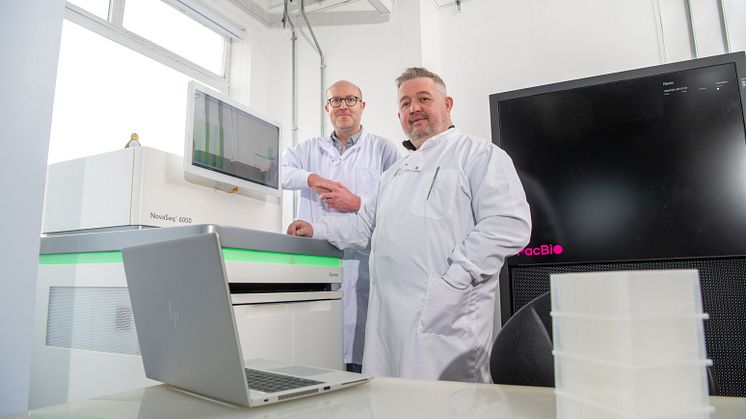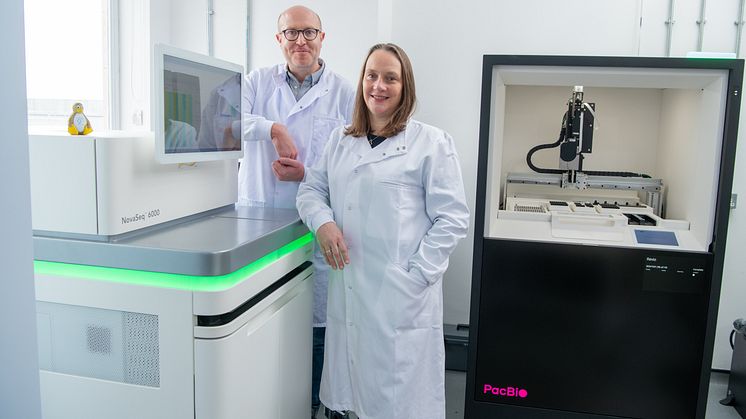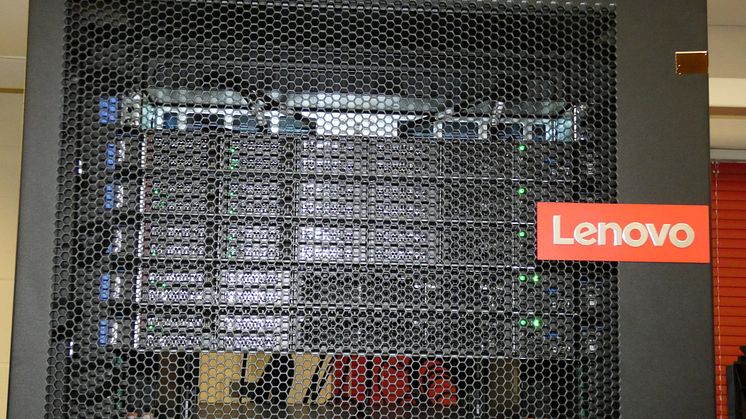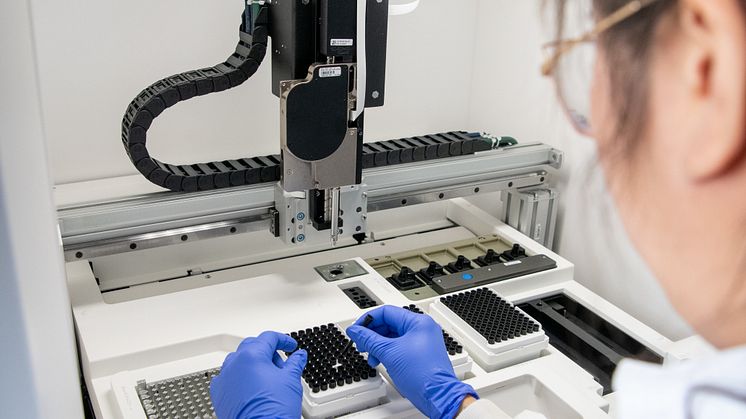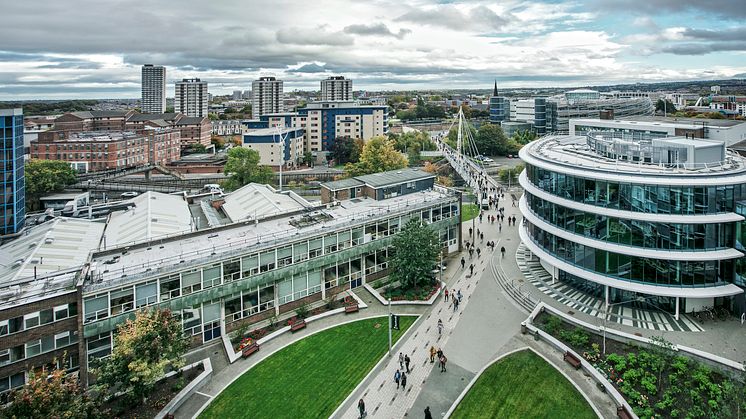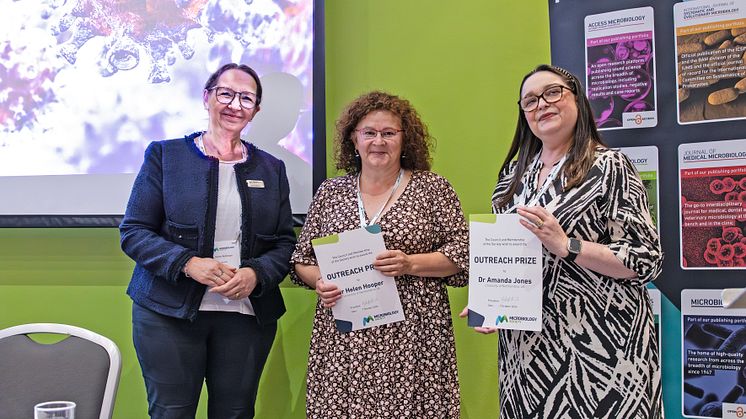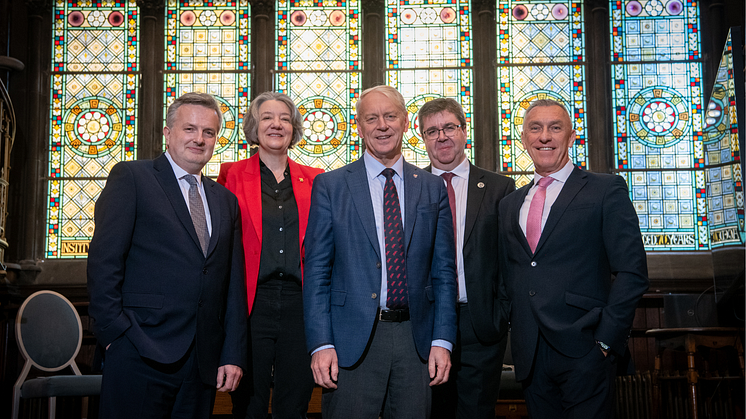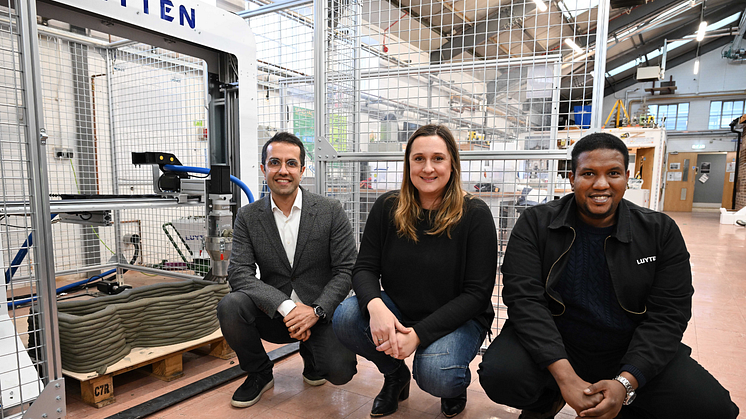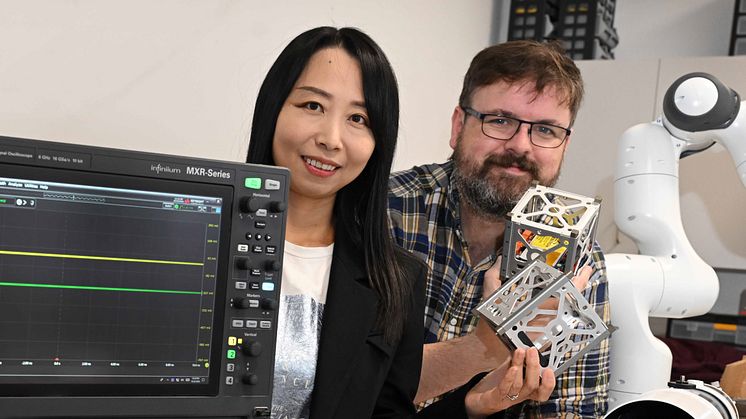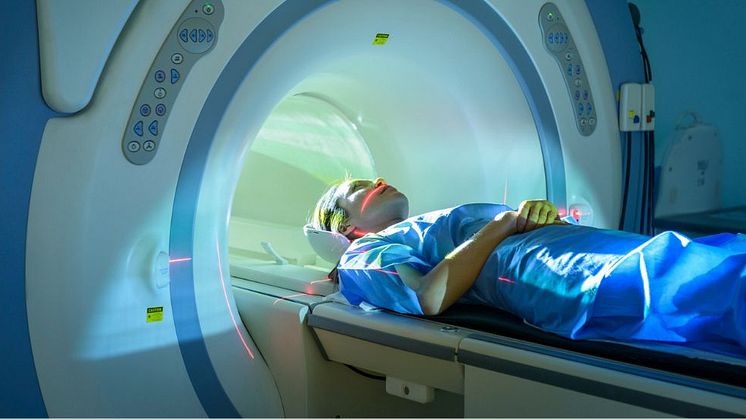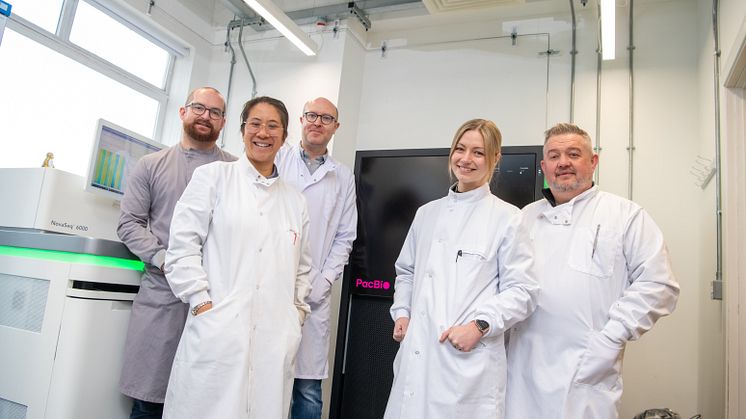
Press release -
Supercomputer investment will power world-leading research and innovation
Northumbria University has announced a multi-million pound investment in its first university-wide high-performance computing facility which will give researchers access to state-of-the-art technology built to handle large scientific datasets at high speeds.
The University has teamed up with global digital technology providers, Lenovo and Logicalis, to deliver the new Higgs high-performance computing (HPC) cluster to put Northumbria at the forefront of technological innovation and further boost research excellence.
Higgs will power world-leading research at Northumbria in areas including DNA sequencing and genomics, solar and space physics, glaciology and climate science, and biotechnologies for renewable energy and sustainable materials.
The name of the cluster was inspired by Professor Peter Higgs, who was born in Newcastle, and whose revolutionary work on the Higgs boson particle changed our understanding of what helps bind the universe together.
Professor Louise Bracken, Pro Vice-Chancellor (Research and Knowledge Exchange) at Northumbria University, said: “This is a major investment which will continue the sustained growth in our research capabilities at Northumbria and demonstrates our commitment to building capacity to support the world-class research that goes on here.
“This really will be a revolutionary project for many of our researchers, particularly those working with large datasets which need to be processed at high speeds. I’m really pleased we’re working with Lenovo and Logicalis to bring the latest high-performance computing technology to our campuses.
“Given the significance of his contribution to the way we understand the world, we have sought permissions from the family of the late Professor Peter Higgs to name the new cluster after the visionary Nobel laureate, whose name lives on through his transformative work.”

Over the next five years, the capabilities of the Lenovo ThinkSystem hardware, powerful AMD EPYC™ processors, and Ubiquity software which makes up the cluster will be regularly reviewed and expanded to ensure it meets the evolving needs of Northumbria’s research community.
In 2022 Northumbria was crowned Times Higher Education’s University of the Year, the most prestigious accolade in the UK higher education sector, in recognition of its transformation over more than a decade into a research-intensive university with social mobility at its heart.
Earlier that year, Northumbria had recorded the biggest rise in research power of any UK university for the second time in a row in the national assessment of research excellence in universities, known as the Research Excellence Framework. A ranking of 23rd in the UK for research power – a measure of the quality and scale of research – confirmed Northumbria’s status as a research-intensive university.
For Professor Darren Smith and Dr Matthew Bashton, whose work in the University’s cutting edge NU-OMICS DNA sequencing research facility was used to assist in the national effort to combat COVID-19, the Higgs cluster will help drive forward research breakthroughs. As part of the COVID-19 Genomics UK consortium (COG-UK) they informed on both hospital and public health outbreaks to support regional infection control teams whilst also supporting national studies as a North East England Hub for SARS-CoV-2 genome sequencing. NU-OMICS also supported the UK Health Security Agency (UKHSA) as a SARS-CoV-2 resilience site using their experience to provide data to the Office for National Statistics (ONS).

Dr Bashton explained: “All our leading research requires computation and, in my own area of research, I had pushed our existing HPC infrastructure to the absolute limit – particularly during the pandemic when Northumbria University was generating far more genome sequencing data than many nation states in the world.
“The Higgs cluster will give us the bandwidth and computational power to fully utilise the DNA sequencing instrumentation that we have in the NU-OMICS lab and get results faster. At the same time, this leading research supports knowledge and teaching at the University, with students benefitting from learning in a research-rich environment.”
Northumbria is also developing the North East Space Skills and Technology Centre (NESST), a £50 million facility that will support world-leading space experts and unite industry with academia to transform the UK space economy. Work led by experts at the University to investigate how best to develop, enhance, and protect the satellite fleets in space, which are relied upon for communications in our daily lives on Earth, will be among the research boosted by the investment in the Higgs cluster.
Dr Simon Corbett, Chief Information Officer at Northumbria University, said: “There’s been brilliant collaboration between IT, procurement and academic staff at Northumbria, who have worked closely with Lenovo and Logicalis to co-design the specification of the cluster so that it gives us everything we need to meet current demand, while ensuring it is capable of growing with us over the coming years to meet future requirements.
“The Higgs cluster will include cutting-edge Lenovo HPC hardware to deal with advanced workloads at high speeds, such as the complex calculations, simulations and modelling carried out by research teams at Northumbria. This partnership with Lenovo and Logicalis signals an exciting time in our journey as a research-intensive university.”
Neil Eke, Chief Executive Officer, Logicalis UKI said: “Logicalis is incredibly proud to partner with Northumbria University and Lenovo in delivering HPC technologies to fuel their cutting-edge research. Our team of dedicated HPC experts will be working closely with the University over the next five years, ready to scale the Higgs cluster’s compute performance and capacity as needed to process ever larger datasets at high speed.”
Discover more about research and innovation at Northumbria in a special case study spotlighting the benefits of the Higgs HPC cluster.
ENDS
Notes to editors
About Northumbria University
Northumbria is a research-intensive university that unlocks potential for all, changing lives regionally, nationally and internationally. Named Modern University of the Year 2025 by The Times and The Sunday Times, Northumbria is based in Newcastle upon Tyne, with an additional campus in London.
Two thirds of Northumbria's undergraduate students come from the North East region and go into employment in the region when they graduate, demonstrating Northumbria's significant contribution to social mobility and levelling up in the North East of England.
Find out more about us at www.northumbria.ac.uk
About Lenovo
Lenovo is a US $62 billion revenue global technology powerhouse, ranked #217 in the Fortune Global 500, employing 77,000 people around the world, and serving millions of customers every day in 180 markets. Focused on a bold vision to deliver smarter technology for all, Lenovo has built on its success as the world’s largest PC company by further expanding into growth areas that fuel the advancement of ‘New IT’ technologies (client, edge, cloud, network, and intelligence) including server, storage, mobile, software, solutions, and services. This transformation together with Lenovo’s world-changing innovation is building a more inclusive, trustworthy, and smarter future for everyone, everywhere. Lenovo is listed on the stock exchange of Hong Kong under Lenovo Group Limited (HKSE: 992)(ADR: LNVGY). To find out more visit https://www.lenovo.com.
About Logicalis
Logicalis is a UK-based, international provider of provider of digital transformation services. With over 7000 staff, based in 30 global territories, Logicalis work with more than 10,000 clients across a range of industry sectors, to create sustainable outcomes through industry-leading technologies and technical excellence.
As “Architects of Change”, the focus at Logicalis is to design, support, and execute customers’ digital transformation by bringing together their vision with its technological expertise and industry insights. The company, through its deep knowledge of key IT industry drivers such as Security, Cloud, Data Management and High Performance Computing (HPC) addresses customer priorities such as revenue and business growth, operational efficiency, innovation, risk and compliance, data governance and sustainability.
Ongoing strategic investment in the UK-based HPC Team is focused on supporting the world’s leading scientific research organisations with industry-leading HPC knowledge, experience and technical innovation.
Logicalis has annualized revenues of $1.7 billion, from operations in Europe, North America, Latin America, Asia Pacific, and Africa.
Picture captions:
- Image 1 – Pictured in the NU-OMICS DNA sequencing research facility at Northumbria University are (left to right) Andrew Nelson, Kim Nguyen-Phuoc, Dr Matthew Bashton, Clare McCann and Professor Darren Smith.
- Image 2 – Dr Matthew Bashton and Professor Darren Smith.
- Image 3 – Dr Matthew Bashton with Professor Louise Bracken.
- Image 4 – Racks which form part of Northumbria University’s new Higgs HPC cluster.
- Image 5 – Kim Nguyen-Phuoc at work in the laboratory.
- Image 6 – Northumbria University’s City Campus in Newcastle upon Tyne.
Topics
Categories
UNIVERSITY OF THE YEAR 2022 (Times Higher Education Awards)
Northumbria is a research-intensive university that unlocks potential for all, changing lives regionally, nationally and internationally.
Two thirds of Northumbria's undergraduate students come from the North East region and go into employment in the region when they graduate, demonstrating Northumbria's significant contribution to social mobility and levelling up in the North East of England.
Find out more about us at www.northumbria.ac.uk
--- Please contact media.communications@northumbria.ac.uk with any media enquiries or interview requests ---







